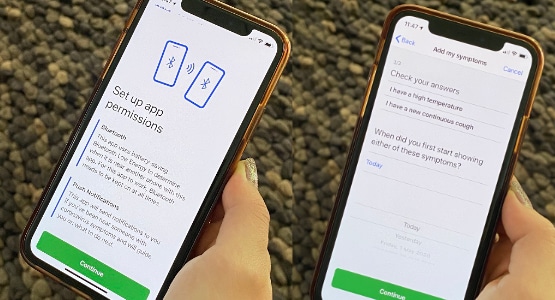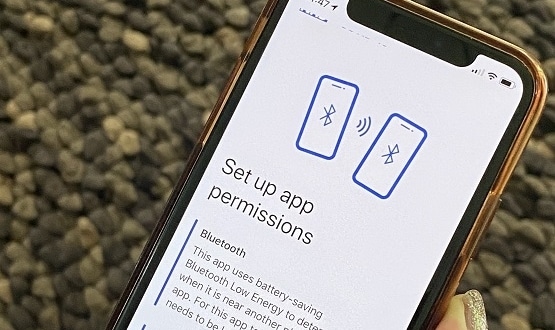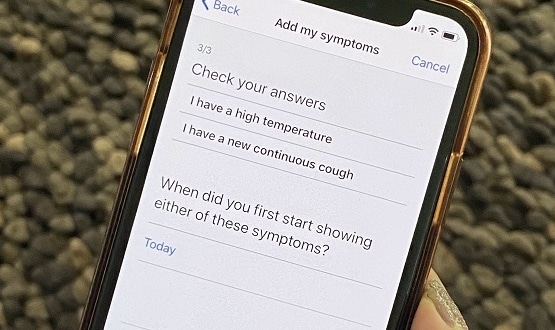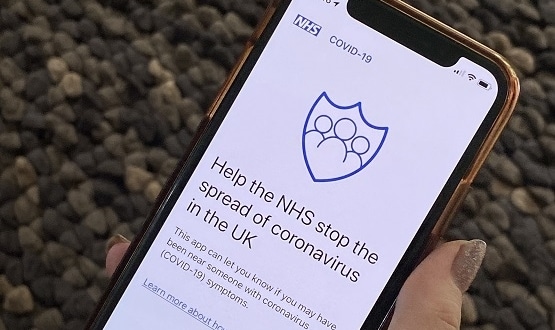Covid-19: NHS contact-tracing app launched in Isle of Wight
- 4 May 2020

A trial of the NHS contact-tracing app has been launched on the Isle of Wight, with a further roll-out of the tool expected in the coming weeks.
The app, which has already been trialled at an RAF base, will form part of the next phase of the governments test, track, trace and isolate approach to help stop the spread of Covid-19.
The trial will begin with healthcare workers on the Isle of Wight tomorrow (5 May) with a wider-roll out to the public on the island on Thursday.
Launching the app at the daily press briefing on 4 May, health secretary Matt Hancock urged those living on the Isle of Wight to download the app to prevent the spread of the virus and protect the NHS.
“This ground-breaking technology, combined with our heroic frontline health and social care staff, and both a nationwide contact tracing testing programme will ensure that we remain in the best position to move toward easing the lockdown,” he said.
It’s hoped the app will help identify cases of coronavirus sooner, resulting in quicker isolation and reduced spread.
But epidemiologists say 60% of the population would need to use the app for it to be successful.
Speaking earlier today at a Science Media Centre (SMC) briefing on the app, Prof Sir Jonathan Montgomery, chair of the ethics advisory board for the app, said market research had revealed a “great willingness” from the public to use the app.
Using Bluetooth the app will work continuously in the background of a person’s phone, storing anonymised identifiers collected from other devices a user comes into contact with.
That information is storied within the app until a person develops potential Covid-19 symptoms.

If, when they input their symptoms into the app, it’s deemed it could be coronavirus, the user will then have the option to send all contact data to a centralised database connected to the app. Information in this database will be used to identify other users potentially at risk, trace the spread of Covid-19 and inform the governments response.
NHSX and epidemiologists at Oxford University have developed an algorithm that will then examine these contacts, included how long they lasted and when they took place, to determine who needs to be alerted to potential exposure to the virus.
A testing capability has also been built into the app, providing a number to call to request a test if one is deemed necessary.

NHSX chief executive, Matthew Gould, said: “By launching the NHS Covid19 app we can reduce transmission of the virus by alerting people who may have been exposed, so they can take action to protect themselves, the people they care about and the NHS.
“When combined with testing and enhanced web and phone contact tracing, this will help the country return to normality and beat coronavirus.”
While deputy chief medical officer Professor Jonathon Vam Tam added: “By widespread testing those suspected to be infected with coronavirus, tracing their contacts and where appropriate advising them to self-isolate, we can slow the onward spread of the virus.
“This new app-based system, developed by technology experts in partnership with clinicians and scientists, will run alongside traditional contact tracing by PHE. If uptake and use is widespread it will give us the greatest room for manoeuvre to ease other social distancing measures.”
NHSX has chosen to take a ‘centralised’ approach to collecting data on potential Covid-19 contacts, compared to Apple and Google’s ‘decentralised’ approach.
This allows anonymous identifiers to be shared centrally, with alerts then being sent out from the system. A decentralised approach means alerts are sent directly to those identifiers from the users own device.

NHSX chief Matthew Gould has repeatedly said a centralised approach would allow the NHS to better respond to the spread of the virus, including optimising the algorithm to make it as accurate as possible.
He also argued a centralised approach would aid the organisation in quickly detecting malicious use.
[themify_box icon=”info” color=”gray”]
More on Covid-19 contact tracing apps
- NHSX sets up ethics advisory board to oversea contact-tracing app
- Contact-tracing apps could ‘catastrophically’ hamper trust, academics warn
- Imperial white paper outlines key data questions for contact-tracing tech
- ‘Absence of evidence’ for Covid-19 contact-tracing apps, review finds
- Digital Health Unplugged: April news team debrief (from home)
- NHSX must be ‘upfront’ about contact-tracing app, privacy group says
[/themify_box]
Privacy concerns
Several concerns around data and privacy and have been raised in relation to contact-tracing apps.
Speaking at the SMC briefing Gould reiterated his previous comments that the NHS would be transparent about how the app works and the data it uses, adding its “vital we maintain public trust”.
He’s previously dismissed suggestions that data from the app will be shared with the private sector.
On the risk of hackers being able to re-identify users of the app Prof Montgomery said the ethics advisory board had deemed there to be no “significant practical risk”.





16 Comments
IW resident but app not in apple or android store for downloading today Thursday 7th May.
Where informed that residents would get info on how to download but as yet no notification.
Iv done the wrong one they asked for proof of ID, passport and a pic of myself, now I’m worried
Which is correct app?
I did exactly the same thing.
What a cock up!
I found it via the county press page eventually
I looked and like somebody said there are a number of apps so which is the one we need ??
My understanding that the app will only trigger once your positive test is confirmed. So the idiots out there can’t skew the operation.
The use of this type of measure will get us back to normal quicker. I’m all for it.
I for one do not mean to stop self-isolating just because of this app (when we eventually find out which app it is ????). The app won’t protect us at all. It may do something to prevent unnecessary surges in infection but the infection will still be just as dangerous to each and every one of us if we do ever get infected. At best it may just help hospital resources stay equipped to treat us.
What is to stop anyone stating on the app that at they have covid 19 when they don’t, thus causing a lot of people to isolate for no reason?
Good point, bearing in mind the number of idiots in our society who ‘couldn’t care less.
Are you from the IOW, if so, what does the App Log look like please, as I cannot find it in the Apple App Store
It would help if we IOW residents were told the NAME of the app. There are many possibles. I just downloaded the wrong one ????. Not a good start…..
I don’t live on the IOW but even so should still be able to see the App for my IOS phone – as the post below indicates, which one is it, there are several !!!!
Any Image or Logo ?
yes I do and i dont think it is there for us yet, i believe it has NHS in the middle with the yellow banner around it….. but I could be wrong
How is a untrained person in the feild of medicine meant to know if a normal cough is just a cough or covid19 its absurd and a waste of time if anyone down loads this app you are well and truly controlled.
Since when have we ever needed a app for a virus.
Is it just me who thinks this is very very weird.
When can the general populous download this app
by GP do you mean english people ? how very inefficient for england, wales, scotland and ireland (tbc) all to be doing there own thing, and are the systems going to be fully integrated, bring on nhs.uk as quickly as possible please and get the resources down to the from line where they need to be !!!
great opportunity to collect data, analyse it and use the insight to ensure all are treated fairly, because leaders need to be fully open … the COVID 19 does NOT treat all equally
Comments are closed.